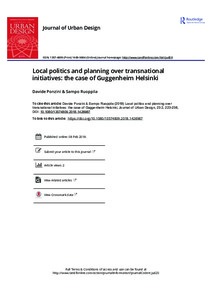Local politics and planning over transnational initiatives: the case of Guggenheim Helsinki
Ponzini Davide; Ruoppila Sampo
https://urn.fi/URN:NBN:fi-fe2021042718684
Tiivistelmä
There has been a tendency to portray municipalities as prone recipients of transnational growth-oriented development initiatives. The processes of transferring transnational urban development models are increasingly depicted as progressively de-politicized, with an emphasis on ‘strategic projects’ over long-term general planning. This study investigating the Guggenheim Helsinki museum initiative (2011–2016) provides one counter-example to highlight the relevance of local politics and planning. In Helsinki, the mayor-driven attempt at de-politicization was quickly rejected by the city council, which instead kept the initiative under political control, supported by a rich public debate highlighting crucial weaknesses and risks in the proposals. The municipality tried negotiating a better deal and adapting the initiative to the local context, including the museum design being shaped by Helsinki’s planning ideals and guidelines. However, the initiative was eventually rejected after a negative risk assessment showing too much dependence on public funding. The study shows that, instead of acting as prone recipients, cities may invest in public debate, improve their ability to assess projects, and avoid bypassing regulations, planning procedures or democratic decision making as if this was required by generic forces of globalization.
Kokoelmat
- Rinnakkaistallenteet [29335]
